【英语】英语阅读理解(人物故事)练习题及解析
英语阅读理解(人物故事)练习题含答案及解析
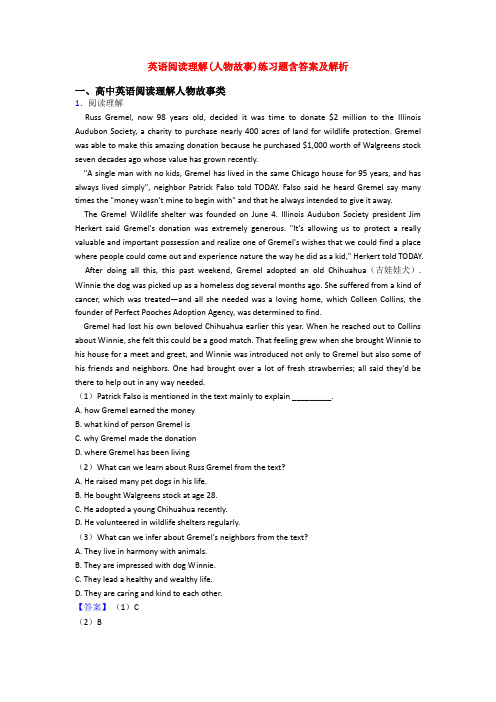
英语阅读理解(人物故事)练习题含答案及解析一、高中英语阅读理解人物故事类1.阅读理解Russ Gremel, now 98 years old, decided it was time to donate $2 million to the Illinois Audubon Society, a charity to purchase nearly 400 acres of land for wildlife protection. Gremel was able to make this amazing donation because he purchased $1,000 worth of Walgreens stock seven decades ago whose value has grown recently."A single man with no kids, Gremel has lived in the same Chicago house for 95 years, and has always lived simply", neighbor Patrick Falso told TODAY. Falso said he heard Gremel say many times the "money wasn't mine to begin with" and that he always intended to give it away.The Gremel Wildlife shelter was founded on June 4. Illinois Audubon Society president Jim Herkert said Gremel's donation was extremely generous. "It's allowing us to protect a really valuable and important possession and realize one of Gremel's wishes that we could find a place where people could come out and experience nature the way he did as a kid," Herkert told TODAY.After doing all this, this past weekend, Gremel adopted an old Chihuahua(吉娃娃犬). Winnie the dog was picked up as a homeless dog several months ago. She suffered from a kind of cancer, which was treated—and all she needed was a loving home, which Colleen Collins, the founder of Perfect Pooches Adoption Agency, was determined to find.Gremel had lost his own beloved Chihuahua earlier this year. When he reached out to Collins about Winnie, she felt this could be a good match. That feeling grew when she brought Winnie to his house for a meet and greet, and Winnie was introduced not only to Gremel but also some of his friends and neighbors. One had brought over a lot of fresh strawberries; all said they'd be there to help out in any way needed.(1)Patrick Falso is mentioned in the text mainly to explain _________.A. how Gremel earned the moneyB. what kind of person Gremel isC. why Gremel made the donationD. where Gremel has been living(2)What can we learn about Russ Gremel from the text?A. He raised many pet dogs in his life.B. He bought Walgreens stock at age 28.C. He adopted a young Chihuahua recently.D. He volunteered in wildlife shelters regularly.(3)What can we infer about Gremel's neighbors from the text?A. They live in harmony with animals.B. They are impressed with dog Winnie.C. They lead a healthy and wealthy life.D. They are caring and kind to each other.【答案】(1)C(2)B(3)D【解析】【分析】本文是一篇记叙文,格雷梅尔是一个没有孩子的单身男人,他在芝加哥同一所房子里住了95年,一直过着简朴的生活。
英语阅读理解(人物故事)练习题20篇及解析

英语阅读理解(人物故事)练习题20篇及解析一、高中英语阅读理解人物故事类1.Directions: Choose the one that fits best according to the information given in the passage you have just read.When she was ten years old, Isadora Duncan dropped out of school to teach people dance. If that job was left to any other ten-year-old, it would have turned out frustrating, difficult, and a little discouraging.But Duncan was different. Not only was she already talented enough to earn money even at that age, but she also had a rare kind of confidence that helped her treat troubles as fuel —something to elevate the fire that is already burning inside of her.It's no surprise, then, that when she moved to New York to join a theatre company, she found herself restricted. The existing dancing style, their way of operating—all of this seemed to her the work of a misguided past. Duncan was very direct about what she wanted, confidently telling people she had a different vision of dance that she was going to spread in the world. This, naturally, led to ridicule and laughs early on, but as she built up her work, these instances became less frequent. Today, she is remembered as "The Mother of Dance," with much of the modern art owing its expressive style to her influence. Inspired by the ancient Greeks, she brought the style to life.In her autobiography (自传), one of the things Duncan frequently refers to as the basis of her expressive spirit is the fact that she had a childhood where she wasn't constantly watched. The expectations of her mother (who raised her) were open-ended. It was the freedom of this lifestyle that drove her to see what she could do.Growing up, before she left school, she was told one of two things: that she was either completely useless or that she was a genius. There was nothing in between. Even when she started working, people either bowed to her or they basically ignored her. But there wasn't one moment Duncan doubted her own genius.There is an old quotation "if you judge a fish by its ability to climb a tree, it will live its whole life believing that it is stupid." And it captures an important truth. At school, Isadora Duncan was a failure. In the dance hall, she gave form to brilliance.(1)What does the underlined phrase "treat troubles as fuel" mean?A.Duncan used troubles to push her forward towards her dream.B.Duncan was good at burning away everyday troubles.C.Troubles turned Duncan into a confident girl.D.Troubles lit the fire of dancing in Duncan.(2)Which of the following is TRUE about Duncan?A.Her experience in New York was the foundation of her career.B.Her teaching job when she was little destroyed her confidence.C.Her dancing style was not very well received at the beginning.D.Her mother set higher expectation on her than she could bear.(3)What does the author try to tell the readers in the last paragraph?A.It is useless climbing a tree to catch fish.B.Everybody is a genius in his own way.C.Miseries come from human stupidity.D.Teachers can impact students greatly.(4)What is this passage mainly about?A.Isadora Duncan's childhood and her achievements today.B.Duncan's career development and other dancers' opinions of her.C.Isadora Duncan's early experiences and the reasons for her success.D.Duncan's high status in the dancing world and her unique expressive style.【答案】(1)A(2)C(3)B(4)C【解析】【分析】本文是一篇记叙文,伊莎多拉·邓肯十岁时辍学去教别人跳舞,作者讲述了她的早期的经历以及其取得成功的原因。
初三英语人物传记故事阅读类试题答案及解析
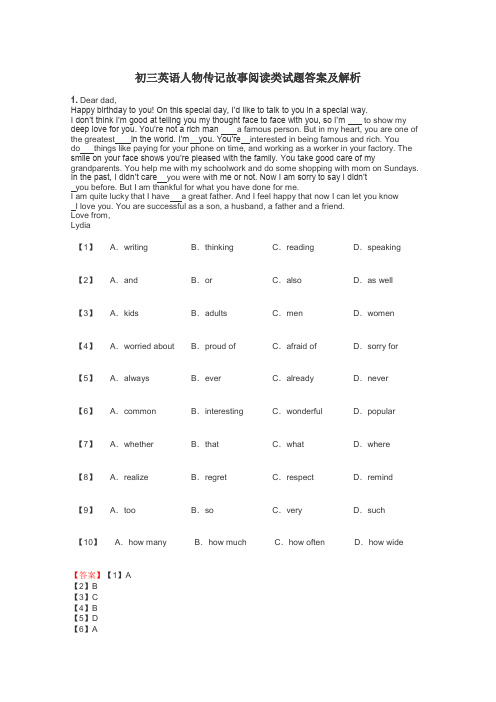
初三英语人物传记故事阅读类试题答案及解析1. Dear dad,Happy birthday to you! On this special day, I’d like to talk to you in a special way.I don’t think I’m good at telling you my thought face to face with you, so I’m to show my deep love for you. You’re not a rich man a famous person. But in my heart, you are one of the greatest in the world. I’m you. You’re interested in being famous and rich. Youdo things like paying for your phone on time, and working as a worker in your factory. The smile on your face shows you’re pleased with the family. You take good care of my grandparents. You help me with my schoolwork and do some shopping with mom on Sundays. In the past, I didn’t care you were wit h me or not. Now I am sorry to say I didn’tyou before. But I am thankful for what you have done for me.I am quite lucky that I have a great father. And I feel happy that now I can let you knowI love you. You are successful as a son, a husband, a father and a friend.Love from,Lydia【1】A.writing B.thinking C.reading D.speaking 【2】A.and B.or C.also D.as well【3】A.kids B.adults C.men D.women【4】A.worried about B.proud of C.afraid of D.sorry for【5】A.always B.ever C.already D.never【6】A.common B.interesting C.wonderful D.popular【7】A.whether B.that C.what D.where【8】A.realize B.regret C.respect D.remind【9】A.too B.so C.very D.such【10】A.how many B.how much C.how often D.how wide【答案】【1】A【2】B【3】C【4】B【5】D【6】A【7】A【8】C【9】D【10】B【解析】这篇短文主要介绍了一个不擅长面对面和父亲交流的孩子给父亲写了一封信以表达对父亲深深的爱。
【英语】 英语阅读理解(人物故事)专题练习(及答案)含解析
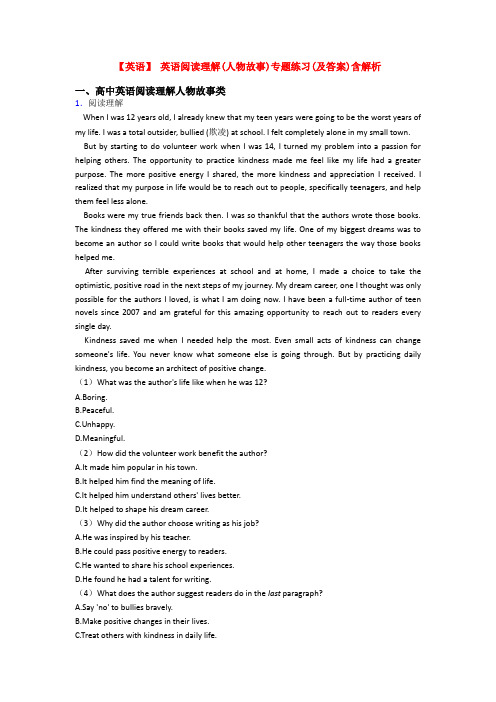
【英语】英语阅读理解(人物故事)专题练习(及答案)含解析一、高中英语阅读理解人物故事类1.阅读理解When I was 12 years old, I already knew that my teen years were going to be the worst years of my life. I was a total outsider, bullied (欺凌) at school. I felt completely alone in my small town.But by starting to do volunteer work when I was 14, I turned my problem into a passion for helping others. The opportunity to practice kindness made me feel like my life had a greater purpose. The more positive energy I shared, the more kindness and appreciation I received. I realized that my purpose in life would be to reach out to people, specifically teenagers, and help them feel less alone.Books were my true friends back then. I was so thankful that the authors wrote those books. The kindness they offered me with their books saved my life. One of my biggest dreams was to become an author so I could write books that would help other teenagers the way those books helped me.After surviving terrible experiences at school and at home, I made a choice to take the optimistic, positive road in the next steps of my journey. My dream career, one I thought was only possible for the authors I loved, is what I am doing now. I have been a full-time author of teen novels since 2007 and am grateful for this amazing opportunity to reach out to readers every single day.Kindness saved me when I needed help the most. Even small acts of kindness can change someone's life. You never know what someone else is going through. But by practicing daily kindness, you become an architect of positive change.(1)What was the author's life like when he was 12?A.Boring.B.Peaceful.C.Unhappy.D.Meaningful.(2)How did the volunteer work benefit the author?A.It made him popular in his town.B.It helped him find the meaning of life.C.It helped him understand others' lives better.D.It helped to shape his dream career.(3)Why did the author choose writing as his job?A.He was inspired by his teacher.B.He could pass positive energy to readers.C.He wanted to share his school experiences.D.He found he had a talent for writing.(4)What does the author suggest readers do in the last paragraph?A.Say 'no' to bullies bravely.B.Make positive changes in their lives.C.Treat others with kindness in daily life.D.Learn to care more about others' feelings.【答案】(1)C(2)B(3)B(4)C【解析】【分析】本文是一篇记叙文,作者讲述了自己参加志愿活动的经历,告诉人们:一次小善举也可能改变一个人的一生。
(英语)英语阅读理解(人物故事)题20套(带答案)

(英语)英语阅读理解(人物故事)题20套(带答案)一、高中英语阅读理解人物故事类1.阅读理解I'm not much of a gardener. I love having beautiful flowers-but I don't have a good track record when it comes to making them grow.A few months after our son left for the Middle East, my friend gifted me a box of tulip bulbs (郁金香球茎). She explained that these bulbs were put into the ground in the fall and lay sleeping all winter. They had all the nutrients they needed inside the bulb and would come out in the spring. ''When you see the leaves of the tiny flowers pushing toward the sun, you'll know that it's almost time for your son to come home. They'll give you what you need most.'' She walked me through the process of planting them. I thanked her — trying to show my gratitude for her gift.It was a long winter — cold and dark. I endured both the weather and the loneliness and fear I felt with my son away. Dead leaves, frost and finally a heavy snow covered the area where I'd planted those flowers, and I soon forgot they were there.Finally the weather began to warm. One day, as I walked down my front steps, I noticed an area of green. I bent down to inspect the situation more clearly and saw that those tulips had begun to grow, their tiny leaves forcing their way to the sun.Day after day I noted the flowers' progress. And day after day, the time approached when my son would finally be home. Now with spring just around the corner, nothing could keep either of us from marching toward the light. Almost all of those bulbs bloomed. And with each brightly colored flower, I marked off one day closer to getting to hold my son in my arms again.(1)What can we know about the author?A.She is a professional gardener.B.She is not good at growing flowers.C.She never plants flowers at home.D.She often sends friends flowers as gifts.(2)Why did the writer forget the tulip bulbs soon?A.The bitter winter reminded her of her son far away.B.She was discouraged from making another attempt.C.They failed to live through the cold and long winter.D.She had no hope for beautiful flowers indeed.(3)What were those flowers mentioned in the last paragraph referred to?A.A physical representation of the hope.B.Things deep inside her heart and soul.C.A lesson she will never forget completely.D.The trouble she had in making them come out.(4)What can be a suitable title for the text?A.A dark winter with hope.B.Planting hope in winter.C.An area of green in spring.D.Living a changeable life.【答案】(1)B(2)D(3)A(4)B【解析】【分析】本文是一篇记叙文,作者的儿子去了中东,作者感到孤独和寂寞。
英语阅读理解(人物故事)练习题20篇及解析
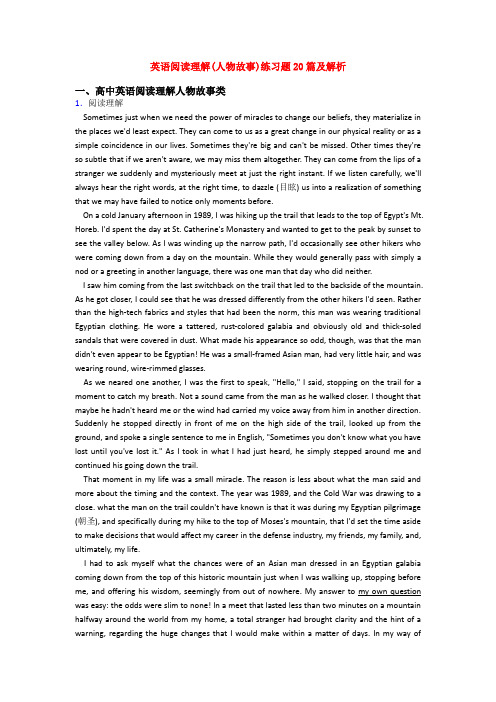
英语阅读理解(人物故事)练习题20篇及解析一、高中英语阅读理解人物故事类1.阅读理解Sometimes just when we need the power of miracles to change our beliefs, they materialize in the places we'd least expect. They can come to us as a great change in our physical reality or as a simple coincidence in our lives. Sometimes they're big and can't be missed. Other times they're so subtle that if we aren't aware, we may miss them altogether. They can come from the lips of a stranger we suddenly and mysteriously meet at just the right instant. If we listen carefully, we'll always hear the right words, at the right time, to dazzle (目眩) us into a realization of something that we may have failed to notice only moments before.On a cold January afternoon in 1989, I was hiking up the trail that leads to the top of Egypt's Mt. Horeb. I'd spent the day at St. Catherine's Monastery and wanted to get to the peak by sunset to see the valley below. As I was winding up the narrow path, I'd occasionally see other hikers who were coming down from a day on the mountain. While they would generally pass with simply a nod or a greeting in another language, there was one man that day who did neither.I saw him coming from the last switchback on the trail that led to the backside of the mountain. As he got closer, I could see that he was dressed differently from the other hikers I'd seen. Rather than the high-tech fabrics and styles that had been the norm, this man was wearing traditional Egyptian clothing. He wore a tattered, rust-colored galabia and obviously old and thick-soled sandals that were covered in dust. What made his appearance so odd, though, was that the man didn't even appear to be Egyptian! He was a small-framed Asian man, had very little hair, and was wearing round, wire-rimmed glasses.As we neared one another, I was the first to speak, "Hello," I said, stopping on the trail for a moment to catch my breath. Not a sound came from the man as he walked closer. I thought that maybe he hadn't heard me or the wind had carried my voice away from him in another direction. Suddenly he stopped directly in front of me on the high side of the trail, looked up from the ground, and spoke a single sentence to me in English, "Sometimes you don't know what you have lost until you've lost it." As I took in what I had just heard, he simply stepped around me and continued his going down the trail.That moment in my life was a small miracle. The reason is less about what the man said and more about the timing and the context. The year was 1989, and the Cold War was drawing to a close. what the man on the trail couldn't have known is that it was during my Egyptian pilgrimage (朝圣), and specifically during my hike to the top of Moses's mountain, that I'd set the time aside to make decisions that would affect my career in the defense industry, my friends, my family, and, ultimately, my life.I had to ask myself what the chances were of an Asian man dressed in an Egyptian galabia coming down from the top of this historic mountain just when I was walking up, stopping before me, and offering his wisdom, seemingly from out of nowhere. My answer to my own question was easy: the odds were slim to none! In a meet that lasted less than two minutes on a mountain halfway around the world from my home, a total stranger had brought clarity and the hint of a warning, regarding the huge changes that I would make within a matter of days. In my way ofthinking, that's a miracle.I suspect that we all experience small miracles in our lives every day. Sometimes we have the wisdom and the courage to recognize them for what they are In the moments when we don't,that's okay as well. It seems that our miracles have a way of coming back to us again and again.And each time they do, they become a little less subtle, until we can't possibly miss the messagethat they bring to our lives!The key is that they're everywhere and occur every day for different reasons, in response to the different needs that we may have in the moment. Our job may be less about questioning the extraordinary things that happen in our daily lives and more about accepting the gifts they bring.(1)Why did the author make a pilgrimage to Mt Horeb in Egypt?A. He was in search of a miracle in his life.B. It was a holy place for a religious person to head for.C. He intended to make arrangements for his life in the future.D. He waited patiently in expectation of meeting a wise person.(2)What does the underlined part "my own question" refer to in paragraph 6?A. For what reason did the man stop before me?B. Why did the Asian man go to the mountain?C. What change would I make within a matter of days?D. What was the probability that others told us the right words?(3)Which of the following is closest in meaning to the underlined word "subtle" in paragraph 7?A. Apparent.B. Delicate.C. Precise.D. Sufficient.(4)The author viewed the meet with the Asian man as a miracle in his life in that ________.A. the Asian man's appearance had a deciding effect on his future lifeB. his words were in perfect response to the need he had at that momentC. what the Asian man said was abundant in the philosophy of lifeD. the Asian man impressed on him the worth of what he had possessed(5)What might be the best title for the passage?A. Can you recognize a miracle?B. Is a miracle significant to us?C. When might a miracle occur?D. Why do we need a miracle?(6)After the encounter of the Asian man, what will the writer probably do immediately?A. Continue walking up to the top of the mountain.B. Have a rest to refresh himself.C. Try to have a heart-to-heart conversation with the Asian man.D. Come down the mountain.【答案】(1)C(2)D(3)B(4)B(5)A(6)D【解析】【分析】本文是一篇记叙文,作者讲述了一次埃及朝圣时,爬到何烈山半山腰时,偶遇了一位正在下山的亚洲陌生人。
英语阅读理解(人物故事)练习题含答案及解析.docx
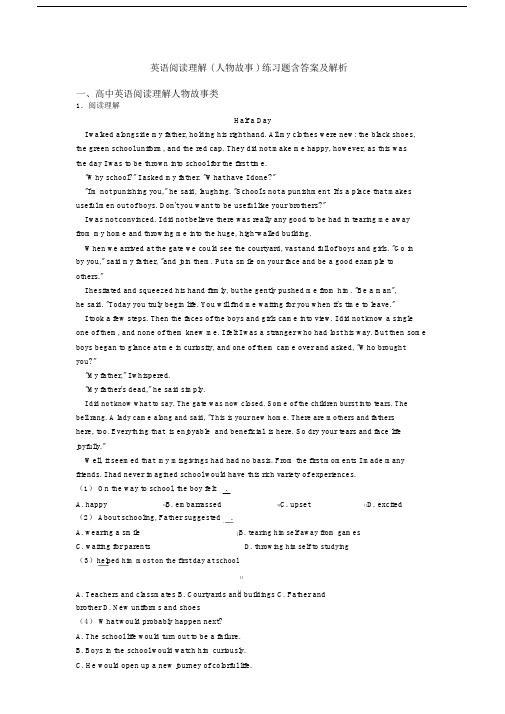
英语阅读理解 ( 人物故事 ) 练习题含答案及解析一、高中英语阅读理解人物故事类1.阅读理解Half a DayI walked alongside my father, holding his right hand. All my clothes were new: the black shoes, the green school uniform, and the red cap. They did not make me happy, however, as this wasthe day I was to be thrown into school for the first time."Why school?" I asked my father. "What have I done?""I'm not punishing you," he said, laughing. "School's not a punishment. It's a place that makes useful men out of boys. Don't you want to be useful like your brothers?"I was not convinced. I did not believe there was really any good to be had in tearing me away from my home and throwing me into the huge, high-walled building.When we arrived at the gate we could see the courtyard, vast and full of boys and girls. "Go inby you," said my father, "and join them. Put a smile on your face and be a good example to others."I hesitated and squeezed his hand firmly, but he gently pushed me from him. "Be a man",he said. "Today you truly begin life. You will find me waiting for you when it's time to leave."I took a few steps. Then the faces of the boys and girls came into view. I did not know a single one of them, and none of them knew me. I felt I was a stranger who had lost his way. But then some boys began to glance at me in curiosity, and one of them came over and asked, "Who brought you?""My father," I whispered."My father's dead," he said simply.I did not know what to say. The gate was now closed. Some of the children burst into tears. Thebell rang. A lady came along and said, "This is your new home. There are mothers and fathershere, too. Everything that is enjoyable and beneficial is here. So dry your tears and face life joyfully."Well, it seemed that my misgivings had had no basis. From the first moments I made many friends. I had never imagined school would have this rich variety of experiences.(1) On the way to school, the boy felt.A. happyB. embarrassedC. upsetD. excited(2) About schooling, Father suggested.A. wearing a smileB. tearing himself away from gamesC. waiting for parentsD. throwing himself to studying(3)helped him most on the first day at school.A. Teachers and classmatesB. Courtyards and buildingsC. Father andbrother D. New uniforms and shoes(4) What would probably happen next?A. The school life would turn out to be a failure.B. Boys in the school would watch him curiously.C. He would open up a new journey of colorful life.D. His parents would accompany him at the school.【答案】( 1) C(2) A(3) A(4) C【解析】【分析】本文是一篇叙文,作者第一天去学校的候并不开心,但是等他到了学校之后,他交了很多朋友,开始了新的生活。
【英语】英语阅读理解(人物故事)题20套(带答案)及解析
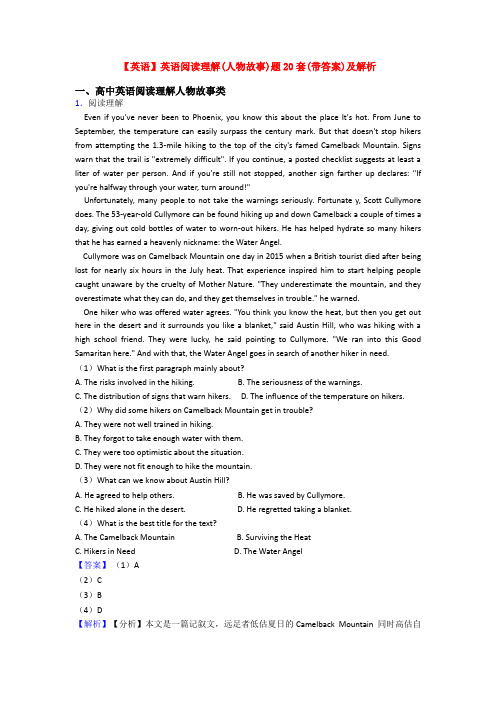
【英语】英语阅读理解(人物故事)题20套(带答案)及解析一、高中英语阅读理解人物故事类1.阅读理解Even if you've never been to Phoenix, you know this about the place It's hot. From June to September, the temperature can easily surpass the century mark. But that doesn't stop hikers from attempting the 1.3-mile hiking to the top of the city's famed Camelback Mountain. Signs warn that the trail is "extremely difficult". If you continue, a posted checklist suggests at least a liter of water per person. And if you're still not stopped, another sign farther up declares: "If you're halfway through your water, turn around!"Unfortunately, many people to not take the warnings seriously. Fortunate y, Scott Cullymore does. The 53-year-old Cullymore can be found hiking up and down Camelback a couple of times a day, giving out cold bottles of water to worn-out hikers. He has helped hydrate so many hikers that he has earned a heavenly nickname: the Water Angel.Cullymore was on Camelback Mountain one day in 2015 when a British tourist died after being lost for nearly six hours in the July heat. That experience inspired him to start helping people caught unaware by the cruelty of Mother Nature. "They underestimate the mountain, and they overestimate what they can do, and they get themselves in trouble." he warned.One hiker who was offered water agrees. "You think you know the heat, but then you get out here in the desert and it surrounds you like a blanket," said Austin Hill, who was hiking with a high school friend. They were lucky, he said pointing to Cullymore. "We ran into this Good Samaritan here." And with that, the Water Angel goes in search of another hiker in need.(1)What is the first paragraph mainly about?A. The risks involved in the hiking.B. The seriousness of the warnings.C. The distribution of signs that warn hikers.D. The influence of the temperature on hikers.(2)Why did some hikers on Camelback Mountain get in trouble?A. They were not well trained in hiking.B. They forgot to take enough water with them.C. They were too optimistic about the situation.D. They were not fit enough to hike the mountain.(3)What can we know about Austin Hill?A. He agreed to help others.B. He was saved by Cullymore.C. He hiked alone in the desert.D. He regretted taking a blanket.(4)What is the best title for the text?A. The Camelback MountainB. Surviving the HeatC. Hikers in NeedD. The Water Angel【答案】(1)A(2)C(3)B(4)D【解析】【分析】本文是一篇记叙文,远足者低估夏日的Camelback Mountain 同时高估自己的能力,所以在远足途中遇到麻烦,Cullymore了解情况后决定帮助他们。
- 1、下载文档前请自行甄别文档内容的完整性,平台不提供额外的编辑、内容补充、找答案等附加服务。
- 2、"仅部分预览"的文档,不可在线预览部分如存在完整性等问题,可反馈申请退款(可完整预览的文档不适用该条件!)。
- 3、如文档侵犯您的权益,请联系客服反馈,我们会尽快为您处理(人工客服工作时间:9:00-18:30)。
【英语】英语阅读理解(人物故事)练习题及解析一、高中英语阅读理解人物故事类1.阅读理解For most of her life, Suanne Laqueur's passion for storytelling was shown on the dance floor.Although Laqueur began writing at a young age, dancing always took center stage. She majored in dance and theater at Alfred University and taught at her mother's dance studio in Croton-on-Hudson, New York, for years. But when her mother was ready to retire and an opportunity opened for Laqueur to take over the studio, she realized she had no interest in taking on the business side of her art: "Owning a studio is a lot of work—financially, logistically. I love the teaching, the choreographing(编舞), the staging, but I didn't want to own it."Yet Laqueur's disinterest in running the studio changed when she became a self-published author. In the fall of 2013, she decided to pursue Self-publishing as a way of sharing her first completed novel with friends and family. During the process, she realized that following her true passion—telling stories through writing—made the business of the art worthwhile, and owning that business meant she could direct her writing career however she chose.Starting with her second self-published novel, she began investing more time in marketing and building her audience. Her investment paid off. Since 2014, Laqueur, now 49, has self-published six novels, which collectively have hundreds of ratings and reviews on Goodreads. Her 2016 novel An Exaltation of Larks stole the show at the 25th Annual Writer's Digest Self-Published Book Awards, topping more than 2,300 entries to win the grand prize."You have to write the most truthful story to you, and I think self-publishing allows that freedom,' she says. "If you work with traditional publishing, it's more about what's marketable, There are trade-offs, which everyone will tell you, but by self-publishing I have control of the book, I have control of the story, and I'm cool with that."(1)From Paragraph 2, we can learn that Laqueur _______.A. was a part-time writer when she was youngB. didn't like teaching dancing in factC. wanted to own a publishing houseD. was interested in running her mother's studio(2)What made Laqueur change her attitude to business?A. Her mother's persuasion.B. The desire to make money.C. Self-publishing her novels.D. Her own passion toward art.(3)Which of the following can best replace the phrase "stole the show" in Paragraph 4?A. became a failure.B. was shown to people.C. got all the attention.D. was accidentally stolen.(4)What can be inferred from what Laqueur's said?A. Self-publishing will replace traditional publishing.B. She will never use traditional publishing.C. Traditional publishing only focuses on the market.D. She enjoys the way of self-publishing.【答案】(1)A(2)C(3)C(4)D【解析】【分析】本文是一篇记叙文,苏安妮·拉克尔大半生教舞蹈,设计舞蹈,在舞台表演,以舞蹈的形式讲述故事。
后来,成为一名自主出版的作家,自费出版了自己的小说。
2016年,她的小说《云雀的狂欢》在第25届《作家文摘》(Writer 's Digest)自出版图书奖上大出风头。
(1)考查细节理解。
根据第二段中的“Although Laqueur began writing at a young age, dancing always took center stage. She majored in dance and theater at Alfred University and taught at her mother's dance studio in Croton-on-Hudson,”可知,跳舞始终是Laqueur的中心。
她在阿尔弗雷德大学主修舞蹈和戏剧,并在她母亲的舞蹈工作室任教多年。
可知,Laqueur是一个兼职作家。
故选A。
(2)考查细节理解。
根据第三段中的“Yet Laqueur's disinterest in running the studio changed when she became a self-published author. In the fall of 2013, she decided to pursue Self-publishin g as a way of sharing her first completed novel with friends and family.”可知,当她成为一名自主出版的作家,想出版自己的小说时,改变了她对商业的态度。
故选C。
(3)考查推理判断。
根据第四段中的“Her 2016 novel An Exaltation of Larks stole the show at the 25th Annual Writer's Digest Self-Published Book Awards, topping more than 2,300 entries to win the grand prize.”可知“第25届年度作家文摘出版图书颁奖上,2300多篇作品获得了大奖”。
可知,这是大出风头,吸引了所有人的关注,故选C。
(4)考查推理判断。
根据最后一段Laqueur所言“There are trade-offs, which everyone will tell you, but by self-publishing I have control of the book, I have control of the story, and I'm cool with that.”可知,她认为自主出版的方式让她能出版自己的书,自己要写的故事。
她对此很满意。
分析选项可知D项符合题意,故选D。
【点评】本题考点涉及细节理解和推理判断两个题型的考查,是一篇故事类阅读,考生需要准确捕捉细节信息,并根据上下文进行逻辑推理,从而选出正确答案。
2.阅读理解In the nineteenth century, one of America's greatest writers, Walt Whitman, helped people learn to value poetry. Whitman created a new kind of poetry.Walt Whitman was born in eighteen nineteen in New York City. During his long life, he watched America grow from a young nation to the strongest industrial power in the world. As a young man, Whitman worked as a school teacher, a printer and a newspaper reporter. He was thirty-six years old when he published his first book of poetry in eighteen fifty-five. He called it Leaves of Grass. It had only twelve poems. The poems are written in free verse. The lines do not follow any set form. Some lines are short. Some are long. The words at the end of each line do not have a similar sound. They do not rhyme.One of America's greatest thinkers and writers immediately recognized the importance of Leaves of Grass. Ralph Waldo Emerson praised Whitman's work. But most other poets andwriters said nothing and even denounced it. Most readers also rejected Whitman's poems. The new form of his poetry surprised many people. Even his own brother told Whitman that he should stop writing poetry. But Whitman had many things to say. And he continued to say them. Readers began to understand that America had a great new poetic voice.Walt Whitman's poems praise the United States and its democracy. The poet expressed his love for America and its people in many ways. Experts today praise Leaves of Grass as a major literary work. In eighteen seventy-three, Walt Whitman suffered a stroke. He spent the last years of his life in Camden, New Jersey. Whitman was poor and weak during the last years of his life. He died in eighteen ninety-two. Some critics say Walt Whitman was a spokesman for democracy. Others say he was not a spokesman for anything. Instead, they simply call him a great poet.(1)What can we know about Whitman?A. His poems have the same rhyme.B. He is the first great poet in the USAC. He helped people to create new poems.D. His poems show his love for his country.(2)Why was Leaves of Grass refused at first?A. The poems are quite short.B. The form of poetry is special.C. Whitman wasn't famous then.D. There are only 12 poems in it.(3)What does the underlined word "denounced" in Paragraph 3 most probably mean?A. Accused.B. Downloaded.C. Published.D. Translated.(4)What can be a suitable title for the text?A. Walt Whitman—a Great SoldierB. Walt Whitman—an Unfortunate PoetC. Walt Whitman and Leaves of GrassD. The First and Greatest Poet in America【答案】(1)D(2)B(3)A(4)C【解析】【分析】本文是一篇人物介绍,介绍了美国著名的诗人Walt Whitman以及他的代表作《草叶集》。
